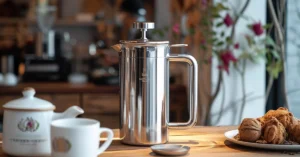Are you a coffee lover who is trying to cut back on caffeine? Maybe you’re wondering if switching to decaf coffee will reduce your bathroom trips. Well, the answer to the question “Does Decaffeinated Coffee Make You Pee More?” is not that straightforward. While decaf coffee may seem like a safe bet for those who are sensitive to caffeine, it still contains compounds that can affect your bladder and make you pee more often.
Studies have found that drinking decaf coffee can increase urination, regardless of whether or not it contains caffeine. This is because decaf coffee still contains other substances that can stimulate the production of urine. One such compound is chlorogenic acid, which is found in coffee and has a diuretic effect, meaning it promotes urine production. So, if you’re looking for a beverage that won’t have an impact on your bathroom habits, decaf coffee may not be the best option.
Coffee’s effect on urination
If you’re a coffee drinker, you’re probably familiar with the urge to visit the bathroom after drinking a cup of coffee. This is because coffee is a diuretic, which means it increases urine production. Furthermore, besides making you feel hungry, coffee could also lead to other side effects, like dizziness. But what exactly causes your urge to pee after drinking coffee or decaffeinated coffee?
Well, there are two main components:
- Chlorogenic Acid
- Caffeine
Chlorogenic Acid’s Impact on Urination

Chlorogenic acid is a natural compound found in coffee, even in decaffeinated coffee. It’s one of those things that might not be the first thing you think about when you sip your coffee, but it can have an impact on your body, particularly when it comes to urination.
Think of chlorogenic acid as a little trigger. When you drink coffee that contains chlorogenic acid, it can stimulate your body to produce more urine. In other words, it tells your bladder, “Hey, it’s time to empty out!” This is known as having a diuretic effect.
So, even though you’re drinking decaffeinated coffee that doesn’t have the usual caffeine kick, the chlorogenic acid inside it can still send signals to your body, making you feel like you need to visit the bathroom more often. It’s like a behind-the-scenes player in your coffee experience, quietly influencing your bathroom habits.
So to get a first answer to the question “Does Decaffeinated Coffee Make You Pee More?” Yes, decaffeinated coffee can make pee more, due to the diuretic effect caused by chlorogenic acid.
Caffeine’s Impact on Urination
As you now know, coffee has a diuretic effect regardless of whether you drink normal coffee or decaffeinated coffee. But what difference does it make if you can do without caffeine with the help of decaffeinated coffee?

Caffeine relaxes the bladder
Caffeine stimulates the release of adrenaline, a hormone that prepares the body for physical activity. Adrenaline increases heart rate, blood pressure, and blood sugar levels, and it also relaxes the smooth muscles in the bladder. This relaxation allows the bladder to hold more urine before signaling the brain that it’s time to urinate.
Caffeine affects receptors that regulate urination
Caffeine also affects the receptors in the bladder and urethra that regulate urination. It increases the sensitivity of these receptors, which means that they require less stimulation to signal the brain that it’s time to urinate. This effect can be especially pronounced in people who are sensitive to caffeine or who consume large amounts of it.
Comparing Decaffeinated Coffee and Regular Coffee
Decaffeinated coffee is made by removing most of the caffeine from regular coffee beans. According to WebMD, the decaffeination process removes about 97% of the caffeine from the coffee beans. So, your average cup of decaf coffee has about 2 mg of caffeine, while your average cup of regular coffee has about 95 mg of caffeine.
While decaf coffee contains significantly less caffeine than regular coffee, it still contains some caffeine. This means that decaf coffee can still have a mild diuretic effect, which can cause you to urinate more frequently. However, the effect is much less than that of regular coffee.
Amazon Brand - Happy Belly
Made with materials harvested from responsibly managed farms - as certified by Rainforest Alliance.
Studies and Research: Does Decaffeinated Coffee Make You Pee?
So does decaffeinated coffee still make you pee, even though there is hardly any caffeine left? The answer is “Yes, decaffeinated coffee makes you pee.” because coffee still has a diuretic effect regardless of the amount of caffeine. The reason for this is the component chlorogenic acid, which stimulates the production of urine.
There are even studies that have explored the effect of normal coffee and that of decaffeinated coffee.

In this study on the effects of regular and decaffeinated coffee on urinary symptoms in young and healthy volunteers, a group of 49 people finished a study. The researchers looked at how often participants needed to go to the bathroom and how urgently they felt the need.
The participants didn’t know whether they were getting regular coffee or decaffeinated coffee. Also, they didn’t have any other sources of caffeine during the study. Before the main part of the study, the participants stopped having caffeine for 5 days. Then, they drank either regular coffee (with 450 mg of caffeine per day) or decaffeinated coffee (with only 12 mg of caffeine per day) for another 5 days.
People who drank normal coffee reported feeling a stronger need to go to the bathroom more often, compared to those who drank decaffeinated coffee.
Another interesting thing they found was that people who didn’t usually drink much coffee felt a bigger increase in urinary symptoms when they drank regular coffee. On the other hand, people who were used to drinking a lot of coffee had fewer symptoms when they drank regular coffee.
This suggests that cutting back on strong coffee might help reduce the urgent feeling and the frequency of needing to use the bathroom, which is especially important advice for people who don’t normally have a lot of coffee. Those who usually drink a lot of coffee seemed to handle the effects of regular coffee better in terms of urinary symptoms.
Health Impacts of Decaffeinated Coffee
Besides the influence on urination, decaffeinated coffee is said to have other effects on our health.

Reduced Anxiety and Insomnia
One of the main reasons people choose decaf coffee over regular coffee is to reduce anxiety and insomnia. Caffeine is a stimulant that can interfere with sleep and increase feelings of anxiety. Decaf coffee, on the other hand, allows you to enjoy the taste of coffee without the negative side effects of caffeine.
Similar Health Benefits to Regular Coffee
Decaffeinated coffee contains similar health benefits to regular coffee. According to Harvard T.H. Chan School of Public Health, decaf coffee has been shown to reduce the risk of type 2 diabetes and some types of cancer. It also contains antioxidants that can help protect your cells from damage.
Methylene Chloride
One concern with decaf coffee is the use of methylene chloride in the decaffeination process. According to Medical News Today, the FDA has approved the use of methylene chloride in the caffeine extraction process as long as the final product contains no more than 10 parts per million of the chemical. While this level is considered safe, some people may still be concerned about the use of this chemical in their coffee.
FAQ – Does Decaffeinated Coffee Make You Pee?
Does decaf coffee cause frequent urination?
Yes, decaf coffee can cause frequent urination. According to a study, drinking decaf coffee leads to an increase in urination, regardless of whether or not you drink caffeine. The reason for this is that decaf coffee still contains other substances that can affect urination, such as chlorogenic acids that can irritate the bladder and make you feel like you have to go more often.
Are there side effects of decaf coffee?
Decaf coffee is generally safe to drink, but it can still cause side effects in some people. Some of the common side effects of decaf coffee include headaches, anxiety, and insomnia. These side effects are usually mild and go away on their own. However, if you experience any severe side effects, you should stop drinking decaf coffee and consult your doctor.
Is decaf bad for kidneys?
Decaf coffee is not bad for your kidneys. In fact, it may even be good for them. Studies have shown that drinking decaf coffee can lower the risk of kidney stones and chronic kidney disease. However, if you already have kidney problems, you should talk to your doctor before drinking decaf coffee.
Is it healthier to drink decaf?
Decaf coffee is generally considered to be healthier than regular coffee. This is because decaf coffee does not contain caffeine, which can cause a range of health problems, such as anxiety, insomnia, and heart palpitations. Decaf coffee also contains antioxidants that can help protect your body against damage from free radicals.
Why do people prefer decaf coffee?
Many people prefer decaffeinated coffee due to unpleasant side effects associated with caffeine consumption. This allows them to enjoy the taste and benefits of coffee without experiencing issues like anxiety, sleep disturbances, or increased heart rate.
If you liked this blog post about the question: Does Decaffeinated Coffee Make You Pee? Don’t forget to leave us a comment down below to tell us about your experience with it.





